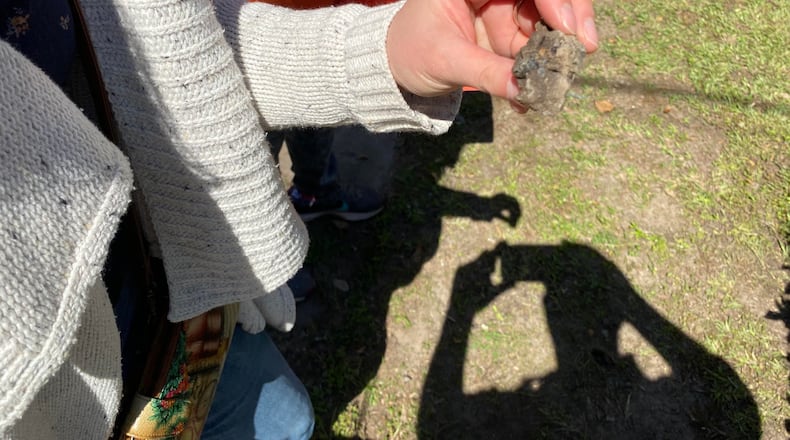In a well-kept west Atlanta yard Saturday, two women held up small pieces of a rock-like material they had spotted on the ground.
It wasn’t rock, the two agreed: it was slag.
Rosario Hernandez and Eri Saikawa know plenty about west Atlanta’s deposits of slag. The stuff is a byproduct of smelting, and many years ago people used it to fill in low-lying areas in the neighborhood.
In this west Atlanta community of high unemployment and child poverty, the slag typically is evidence of lead — a powerful neurotoxin that’s especially harmful to children.
Hernandez, who works with Historic Westside Gardens, was among the first residents of the area whose soil was analyzed for lead. Her yards, with slag visible in chunks at the surface, showed alarming levels of lead in a soil analysis by a team led by Saikawa, an Emory professor.
Those findings of contamination led the federal Environmental Protection Agency (EPA) to investigate a large swath of the English Avenue neighborhood for lead in the soil. That investigation was expanded to more properties a year ago.
And now, the agency is expanding the area studied even more — almost doubling the number of properties covered, to more than 2,000.
Credit: EPA
Credit: EPA
The EPA’s Leigh Lattimore, a remedial project manager, said last week that the expansion has to do with “the science and the data.”
The agency’s investigation, both in the original area and in the expanded one, continues to find about 40% of properties with soil lead levels above the EPA remedial threshold of 400 parts per million, Lattimore said. Properties above the limit can get their soil dug up and replaced for free with funding from Superfund appropriations, though the area has not been designated as a site on the Superfund National Priorities List.
Saikawa said the yard they examined Saturday, with its pieces of slag, had tested at a level above the EPA’s remediation limit.
The border of the expanded testing area, just northwest of Mercedes-Benz Stadium, now runs north to Wheeler Street, west to Joseph E. Lowery Boulevard, south to Martin Luther King Jr. Drive and east to Northside Drive.
Children at highest risk
Lead occurs naturally and has been used extensively in various industries over the years. That use has been reduced, though not eliminated, as the metal’s dangers have become better known.
Even at low levels, lead can damage children’s brains, lowering intelligence and weakening their powers of self-control and concentration, researchers have found. At higher levels, lead can affect growth, and it can replace iron in the blood, leading to anemia and fatigue.
Children can absorb as much as 90% more lead into their bodies than adults.
There is no safe level of lead exposure, the Atlanta-based Centers for Disease Control and Prevention says.
Credit: ANDY MILLER
Credit: ANDY MILLER
In adults, lead poisoning can cause an increased risk of high blood pressure and damage the nerves and kidneys. It also can cause miscarriages.
Lead poisoning can come from several sources, including water, paint, house dust, even certain toys and imported candies.
Credit: ANDY MILLER
Credit: ANDY MILLER
Reaching out to residents
On Saturday morning, Hernandez and Saikawa joined dozens of volunteers handing out leaflets and telling residents of the mostly Black community about the EPA’s free lead testing of soil, and urging them to get children tested for poisoning.
The volunteer education effort has swelled with help from the Westside Health Collaborative, an initiative of the Arthur M. Blank Family Foundation.
“This neighborhood was used as a dumping ground,’' Hernandez told the volunteers. “We’re letting people know that lead is not safe. This could be why kids are having a hard time learning.’'
Credit: ANDY MILLER
Credit: ANDY MILLER
The neighborhood they canvassed shows startling differences even on the same block. Some properties are renovated and neat, while others have boarded-up houses and trash-strewn sidewalks. Empty lots have weeds standing waist high.
From Georgia Department of Public Health data, The Atlanta Journal-Constitution previously found historical evidence of lead poisoning in children in the Elm Street ZIP code, where Hernandez lives, and in the ZIP code next to it.
Throughout the English Avenue investigation, the EPA has had difficulty getting property owners’ permission to take soil samples in the neighborhood, sometimes because there’s a problem contacting owners. More than 83% of the area’s residents are renters, according to census data. Tenants, though, can give permission for property to be tested, the EPA says.
Saikawa, whose team discovered the lead problem in 2018, said she’s pleased that the EPA has extended the study area, citing the potential harm for children. As the investigation widens, she added, “it’s very possible we would see more expansion.’'
Help for west Atlanta residents
Residents can call the Westside Lead Community Outreach number at (678) 662-8603 or contact Westside Community Health Workers at 404-481-5790, or email westsidereferrals@chris180.org.
About the Author
Keep Reading
The Latest
Featured




